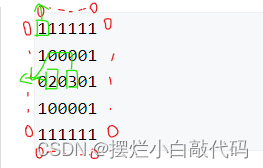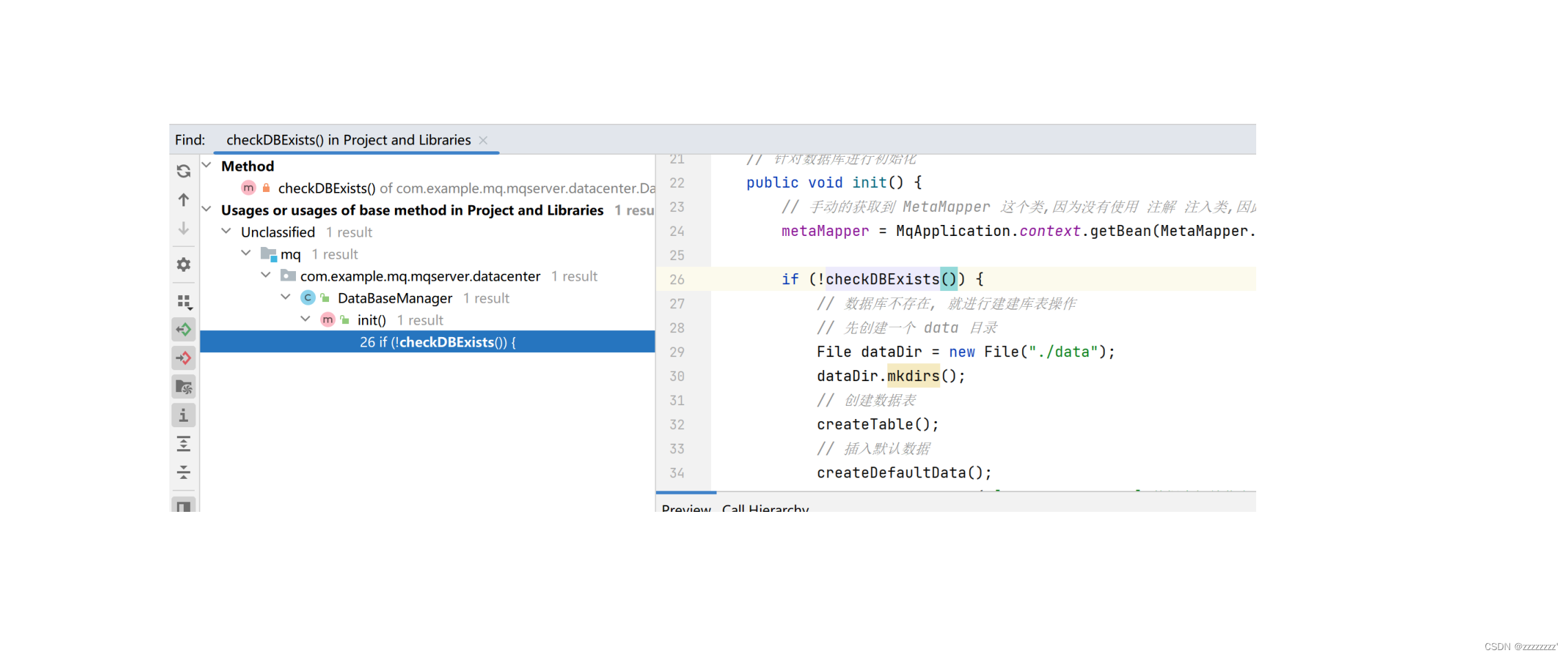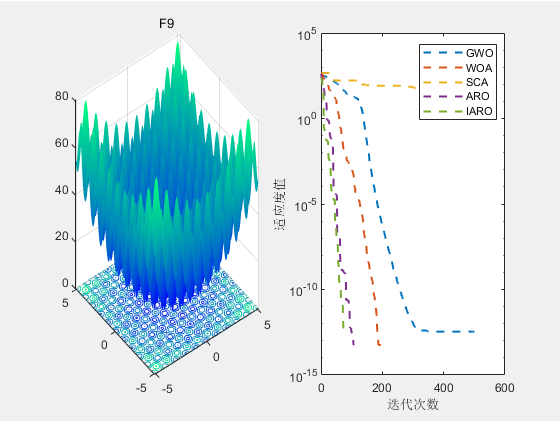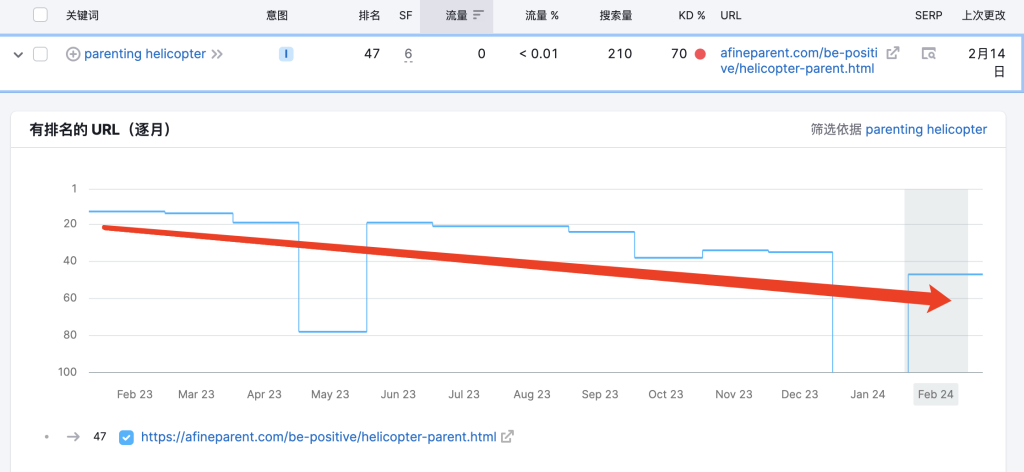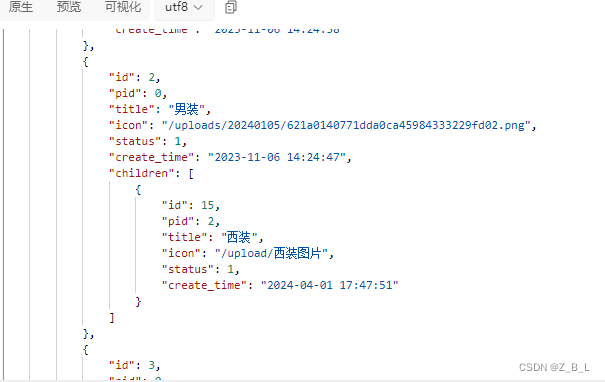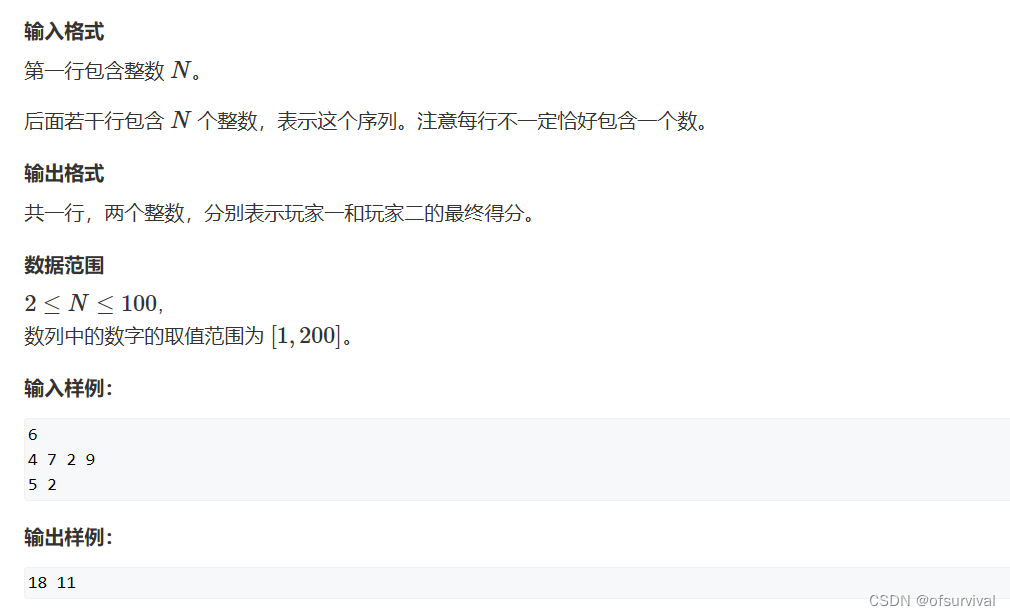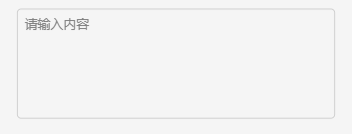这段时间由于项目的需要,需要将yolov8部署到C++上以及跟相应的算法结合,花了我不少时间。
现阶段有考虑过使用onnx转Tensort,但是无法输出分类的结果,故放弃,有目标检测的小伙伴可以试试,接下来使用onnxruntime来试试。
win10下 yolov8 tensorrt模型部署_tensort8.4.2.4-CSDN博客
下面我将尝试用opencv CPP推理我们得到onnx文件
参考文章
VS2019配置onnxruntime推理环境 - 知乎 (zhihu.com)
yolov8 opencv模型部署(C++版)_yolov8 c++-CSDN博客
Opencv模型部署 onnxruntime调用yolov8(C++)
方法一
这个案例可以参考
C++ OpenCV onnxruntime调用yolov8 onnx模型_哔哩哔哩_bilibili
相应源代码
百度网盘 请输入提取码
OnnxRuntime调用onnx优点
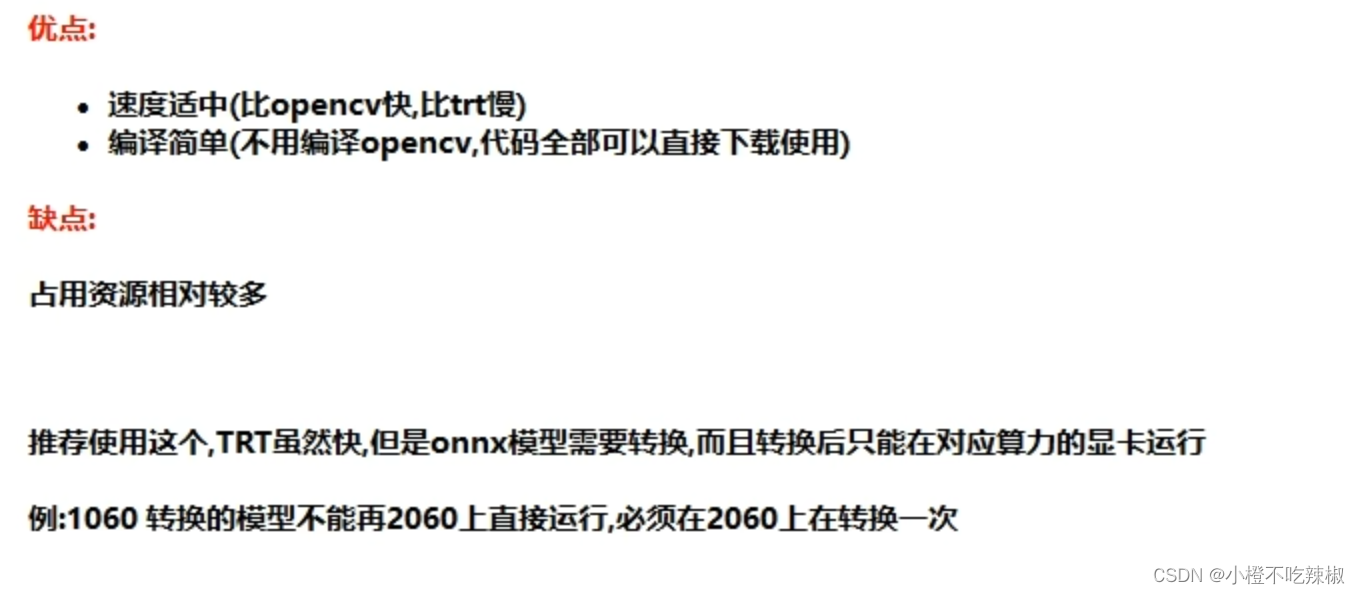

ultralytics/examples/YOLOv8-ONNXRuntime-CPP at main · ultralytics/ultralytics (github.com)

下载我们yolov8相应源代码
创建新项目
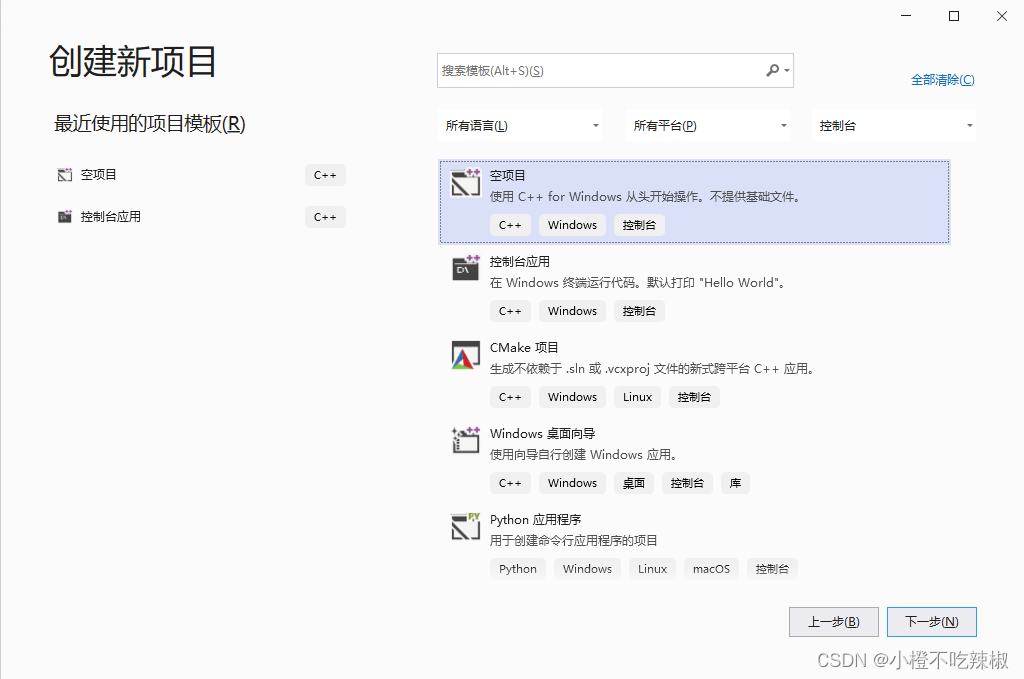
创建我们的新项目并命名,导入相应的文件

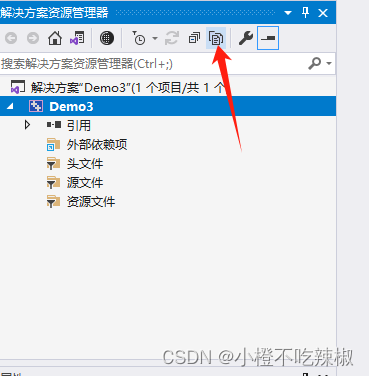
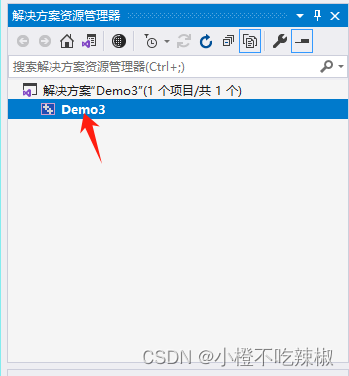
右键我们的Demo3,并选择"在文件资源管理器中打开文件夹"
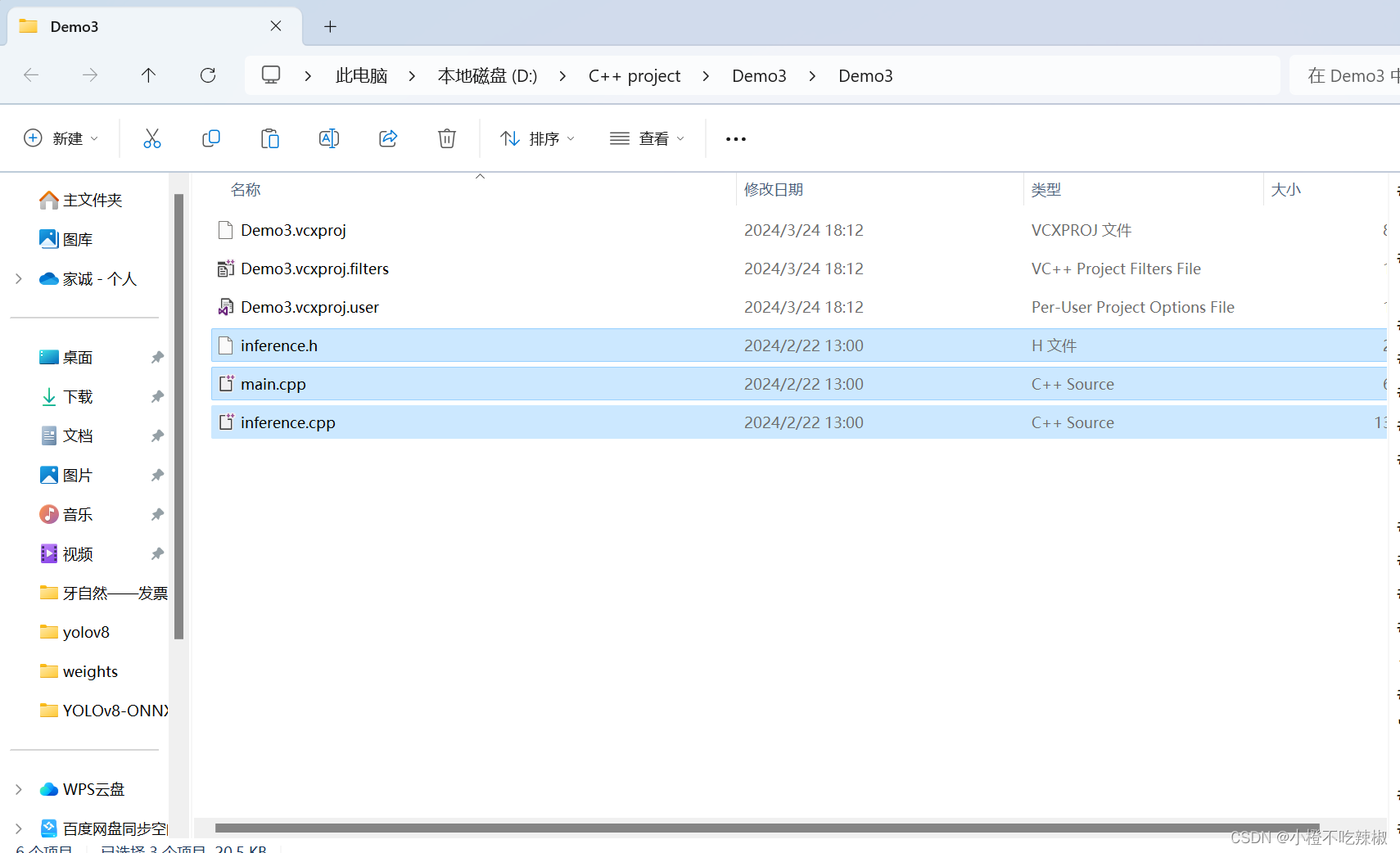
复制到相应位置

右键选择包括在项目中

添加一下我们对应的引用

这里我们要选择配置我们的Release x64,下面的我是忘记改了,后面想起来了,所以下面的步骤不变。
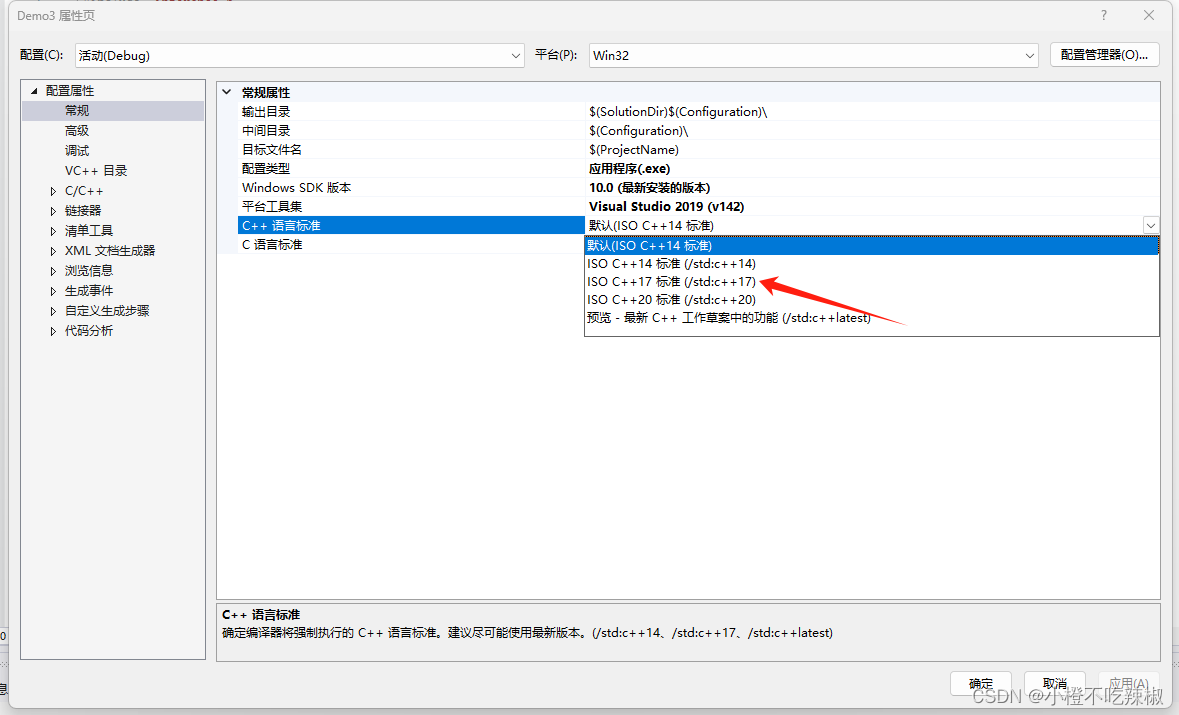
右键我们的项目,设置我们的属性,设置语言标准为C++ 17
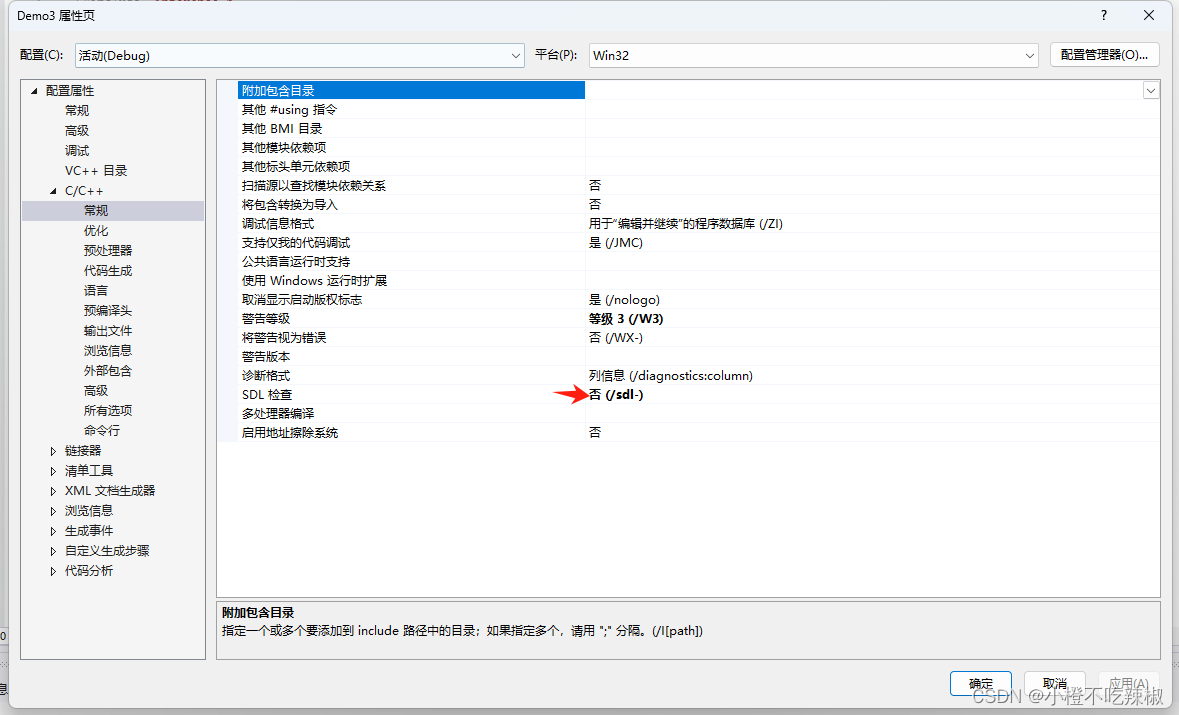
修改我们的安全检查,如果不修改的话,后期可能还会有错误,不修改的话我们自己也可以使用自定义宏进行处理
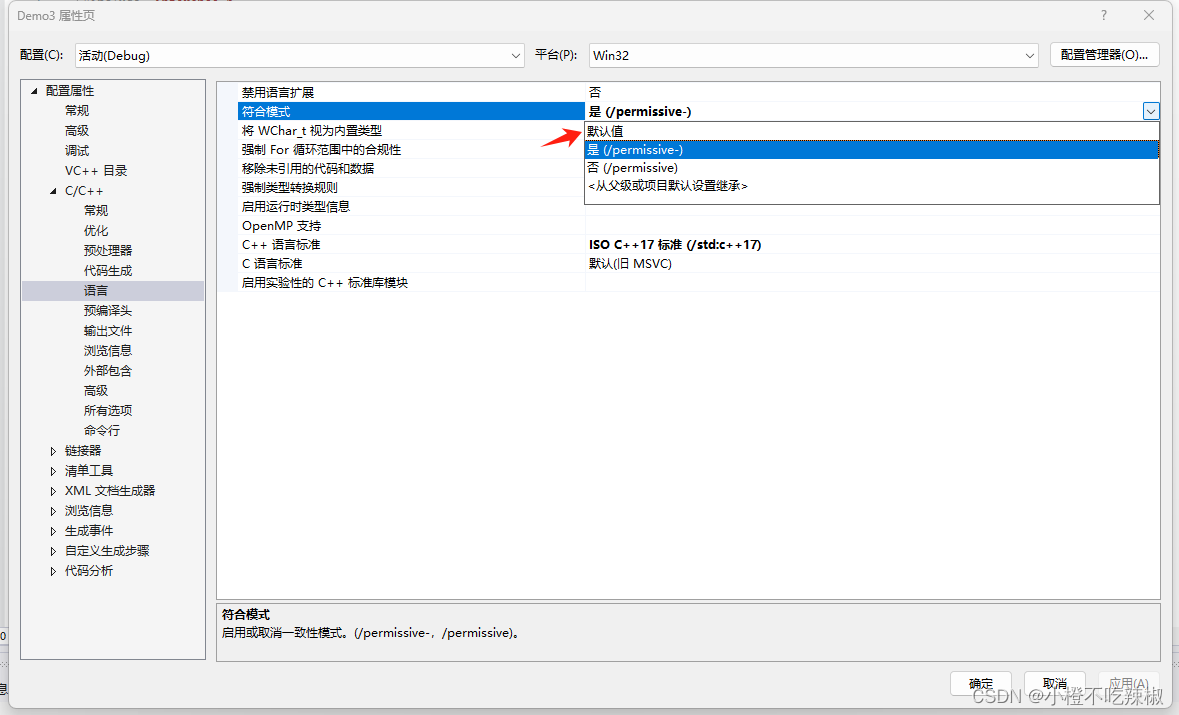 对应的语言模式改为默认值,如果不改的话string型改为char型的话是需要手动进行的
对应的语言模式改为默认值,如果不改的话string型改为char型的话是需要手动进行的
引入头文件
opencv(图像处理,就是我们读图然后处理图像的时候使用)
Releases - OpenCV
CUDA(使用GPU加速的时候需要使用)11.8版本
CUDA安装教程(超详细)-CSDN博客
这里我先使用的是自己先前下载的11.7版本的试试
onnxruntime 1.15.1版本
Releases · microsoft/onnxruntime (github.com)
这里我先使用自己先前的版本试试
onnxruntime-win-x64-gpu-1.17.1(之前的版本)

Releases · microsoft/onnxruntime (github.com)
添加lib引用
我们可以在我们相关的文件里找到相应的dll文件
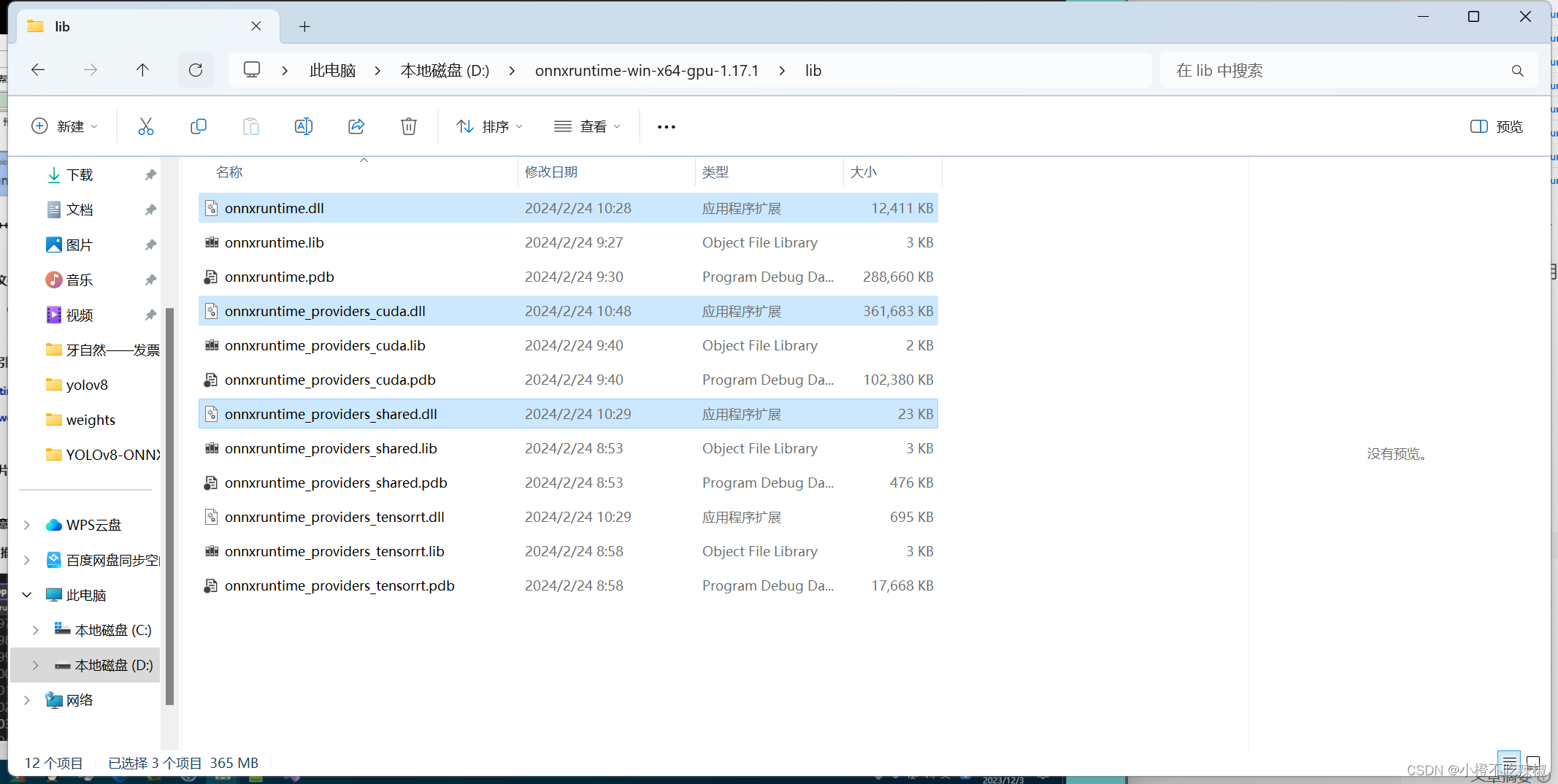

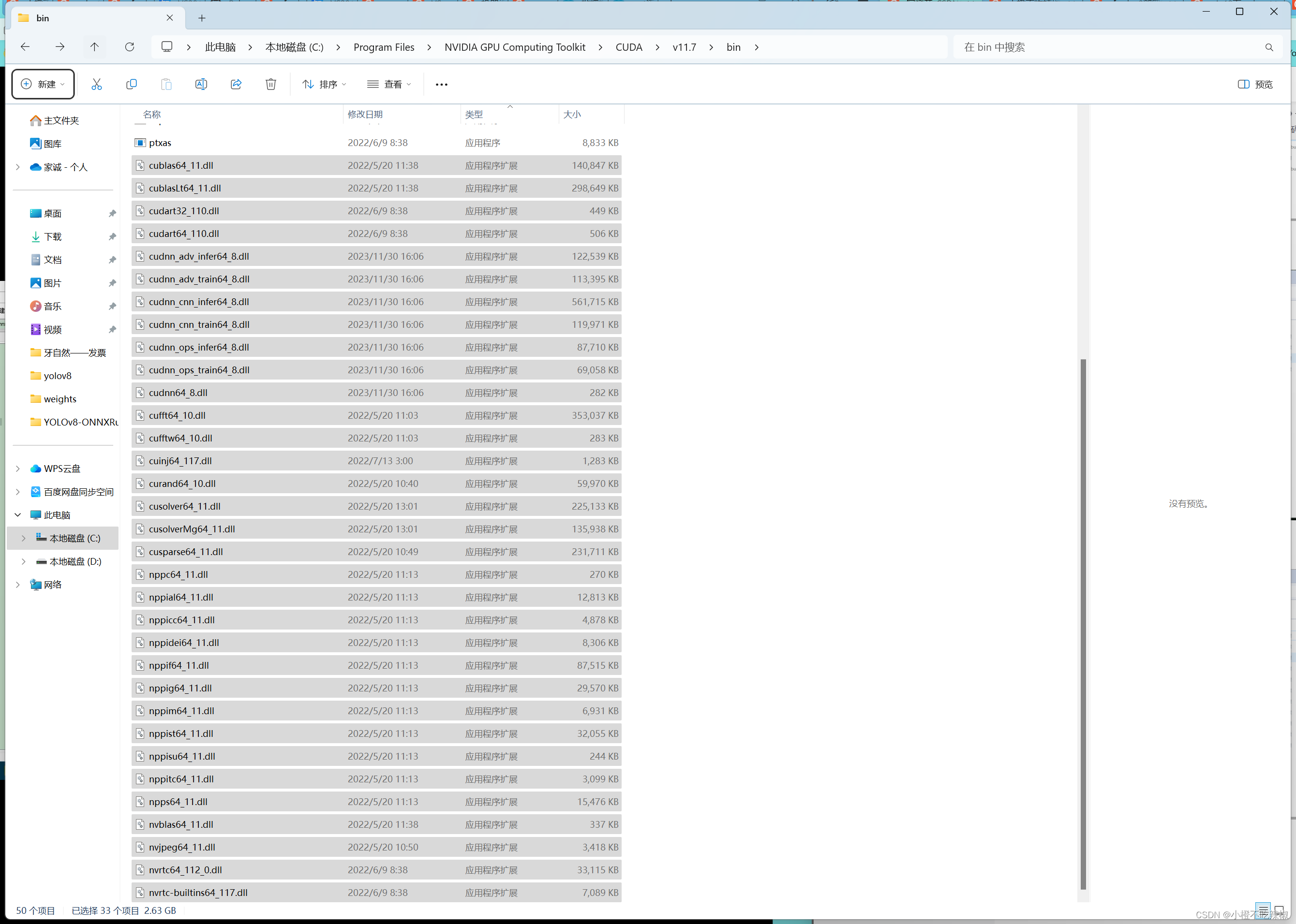
放入我们的文件夹里


从这里C:\Program Files\NVIDIA GPU Computing Toolkit\CUDA\v11.7\include
导入我们相应的文件
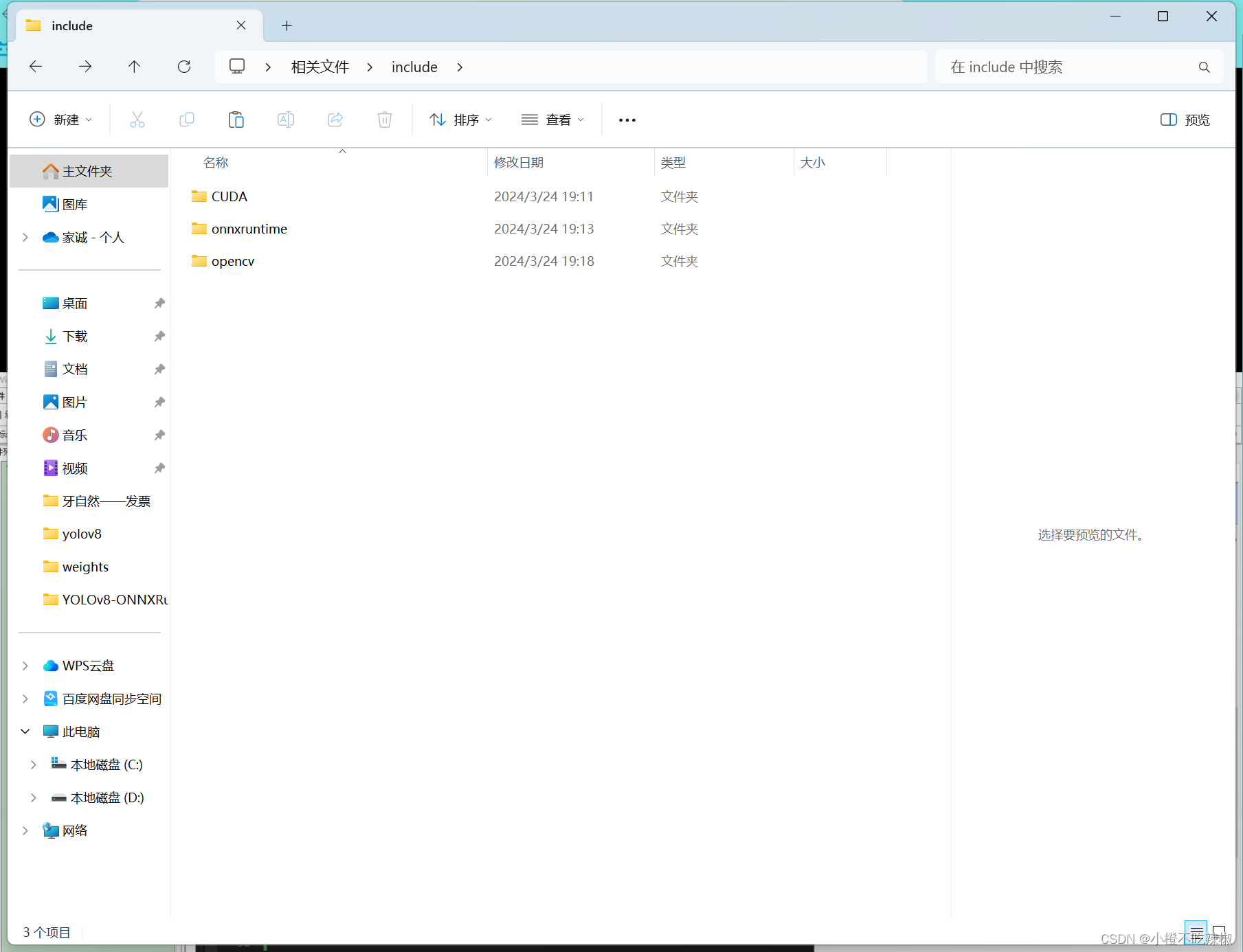
我们的onnxruntime跟opencv也是这样操作
添加我们的lib文件

将我们的lib文件跟include文件复制粘贴到我们的项目下
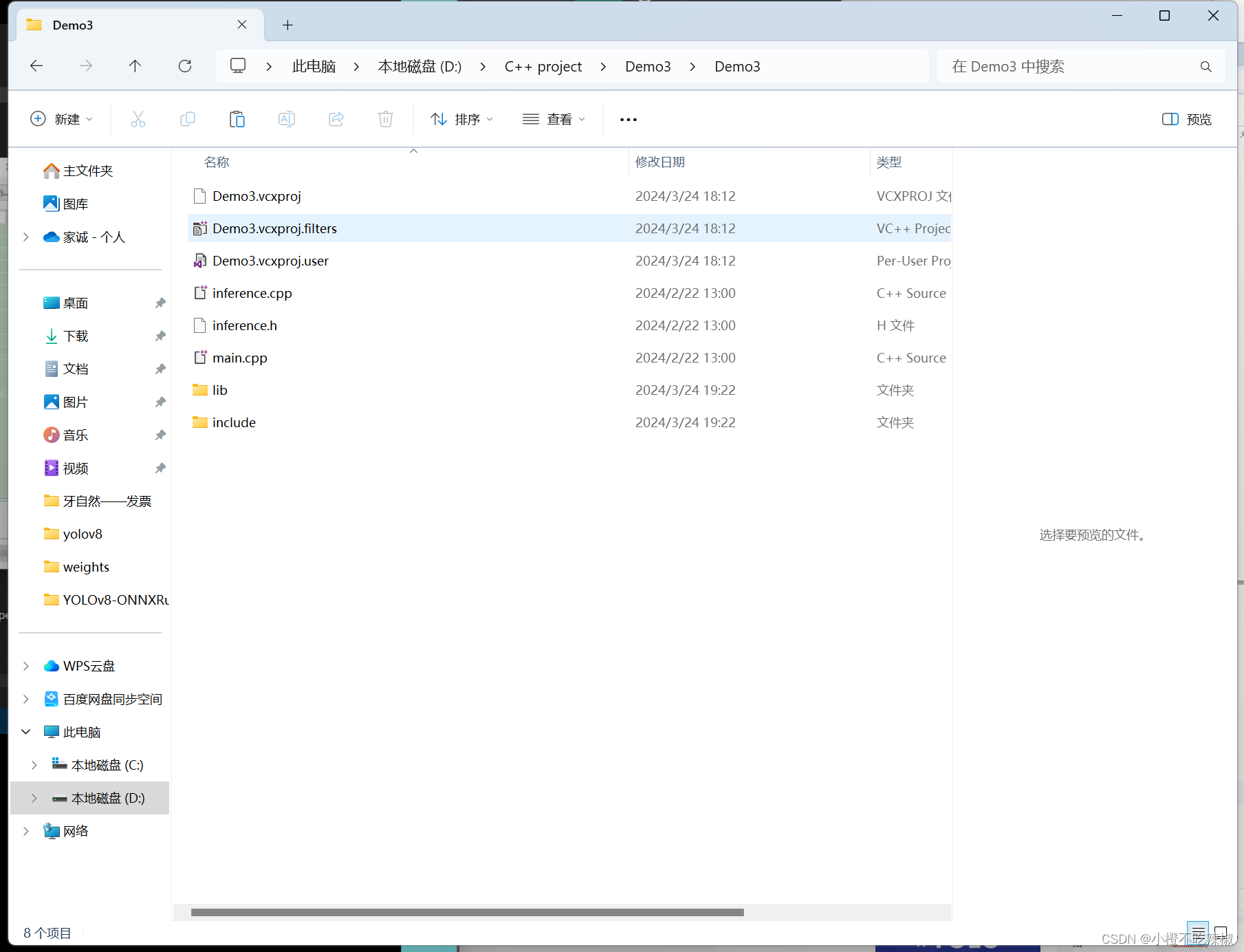
调整我们的项目路径
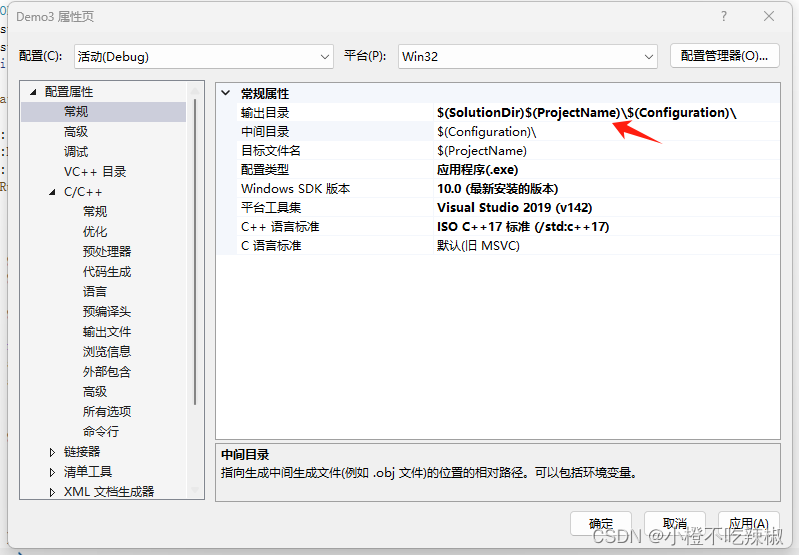

添加我们三个对应头文件的目录
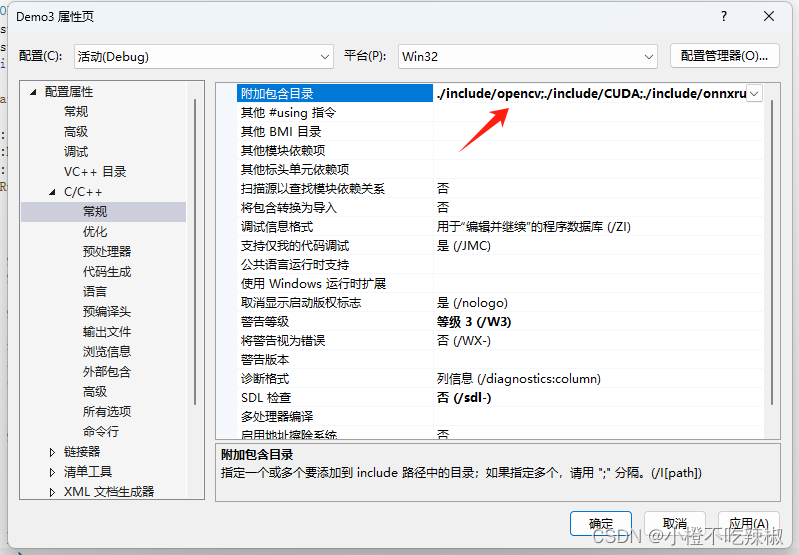
添加我们对应的引用
./include/opencv;./include/CUDA:./include/onnxruntime;
这三个头文件我们就添加好了


我们右键生成我们的项目,发现生成失败了,再继续按照上面的视频操作,肯定哪里有问题,有成功的小伙伴
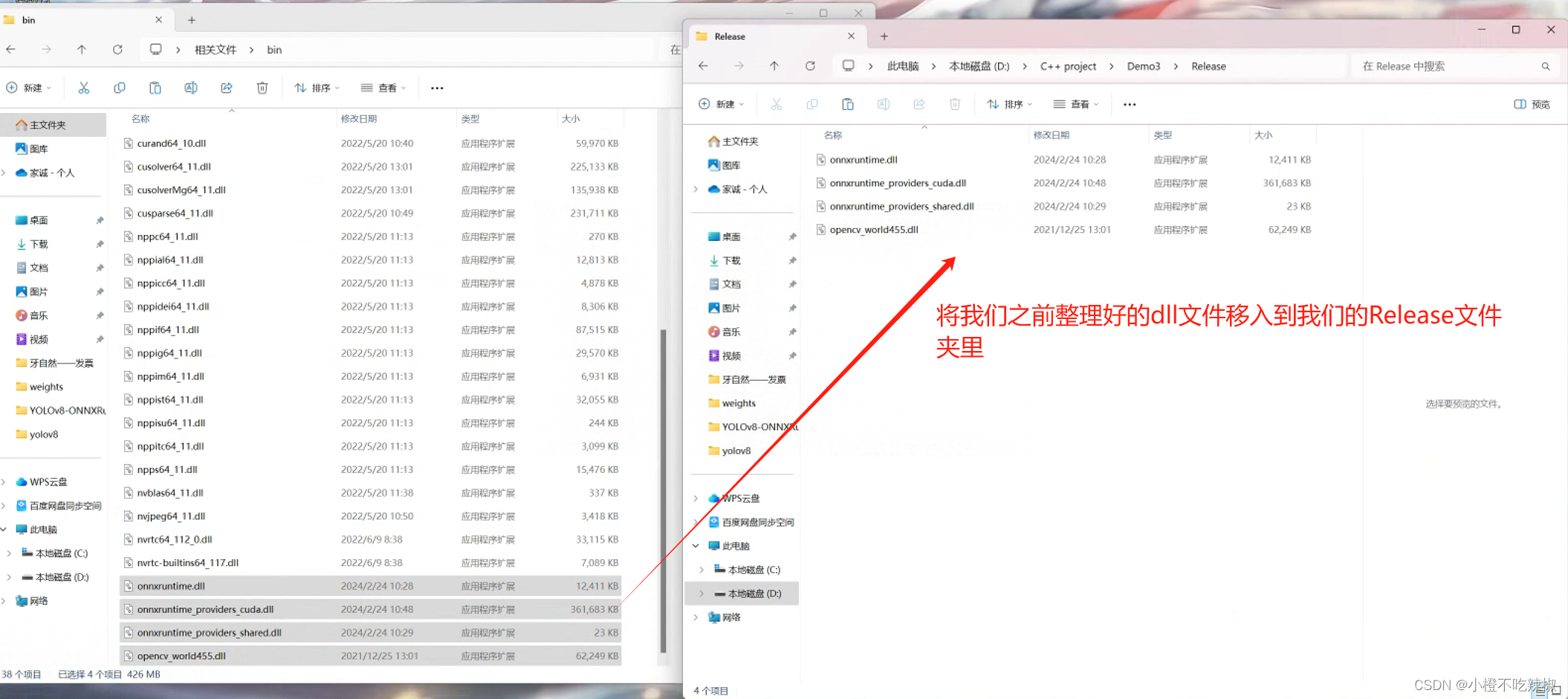

然后我们回来看到我们的主函数,这里他是要找到我们对应的标识文件,这里我们可以给他注释

这里我们使用官方的案例来做



将我们相应的文件跟图片移入
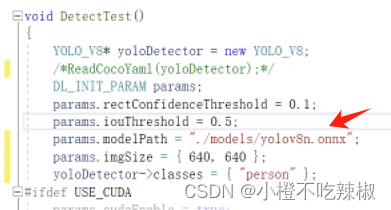
调整我们的模型文件路径
再次重新生成一下

这里我们生成失败了,可以再使用up主给的文件再试试。(步骤还是按照上面的来)
百度网盘 请输入提取码
方法二(推荐)
VS2019配置onnxruntime推理环境 - 知乎 (zhihu.com)
主要参考的文章
由于我之前部署过tensorrt的成功了
所以我猜应该是配置属性表这边出了问题
解决:error C1083: 无法打开包括文件: “opencv2/opencv.hpp”: No such file or directory-CSDN博客
严重性 代码 说明 项目 文件 行 禁止显示状态 错误 LNK2001 无法解析的外部符号 “void __cdecl cv::imshow(class std::basic_string<char,_严重性代码说明项目文件行禁止显示状态 错误lnk2001无法解析的外部符号-CSDN博客
这个是一个问题的解决方法,但是我后面把Opencv里的Lib文件换成了opencv.4.9.0的版本就没有报错了
后来发现确实是这
win10下 yolov8 tensorrt模型部署_tensort8.4.2.4-CSDN博客
VS配置属性表,保存Opencv配置信息_vs属性表-CSDN博客
可以参考这两篇文章

我们找到自己参考上面两篇文章以及配置好的属性表去重新配置
目前我成功生成的onnxruntime版本是onnxruntime-win-x64-gpu-1.17.1
opencv版本是4.9.0
期间出现了找不到opencv_490world.dll文件,我们需要将相应的两个dll文件复制粘贴至相应的文件夹下
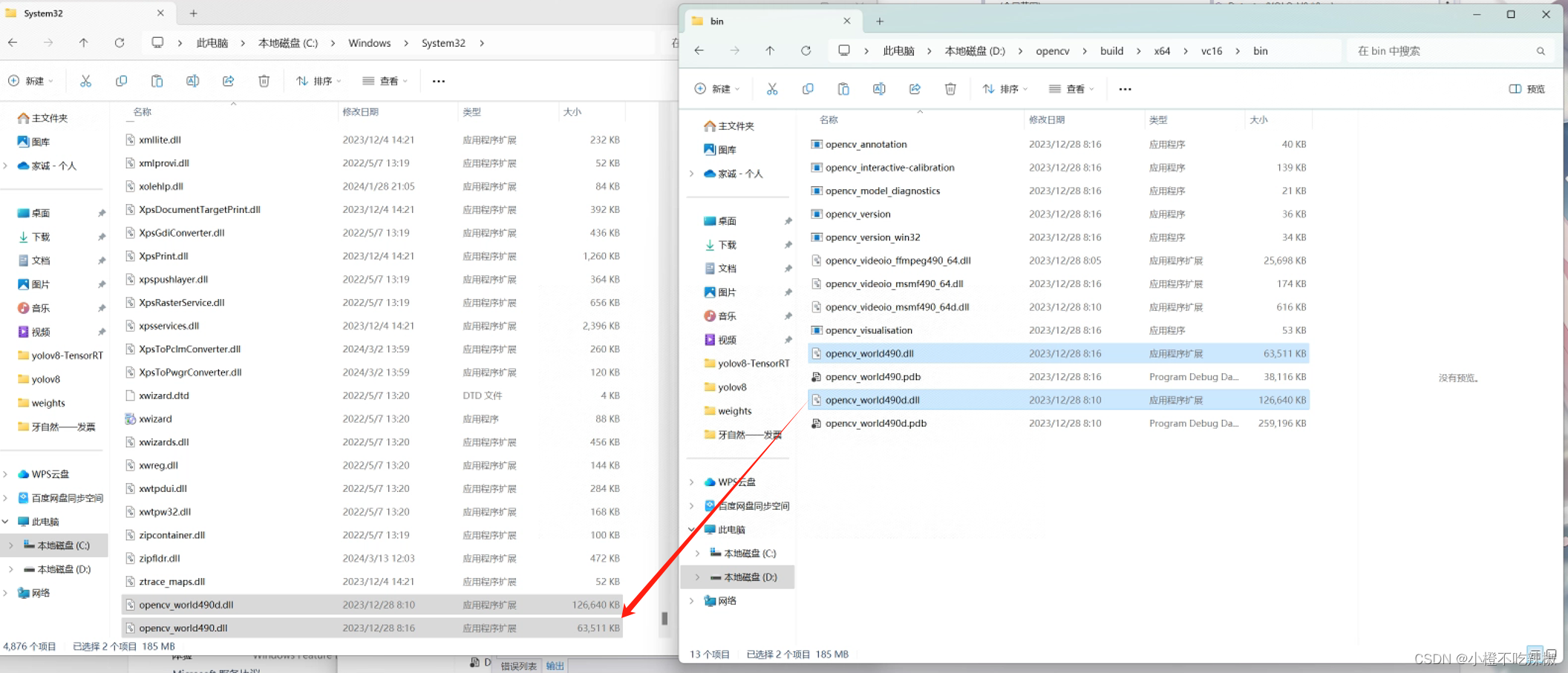
又出现了未经处理的异常的问题
解决方法:
Opencv 未经处理的异常 Microsoft C++ 异常: cv::Exception,位于内存位置_: microsoft c++ 异常: cv::exception,位于内存位置 0x0000002-CSDN博客

这是我配置好的属性管理器
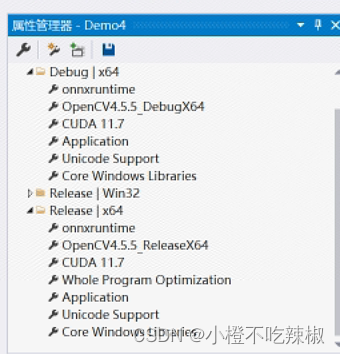
小结
最后总算成功了,但是我的检测模型的框都在左上角不知道怎么回事,知道的小伙伴可以帮我解答一下吗?
代码
main.cpp
#include <iostream>
#include <iomanip>
#include "inference.h" // 导入推理相关的头文件
#include <filesystem>
#include <fstream>
#include <random>
#include <regex>
// 对图像进行检测
void Detector(YOLO_V8*& p) {
// 获取当前工作目录
std::filesystem::path current_path = std::filesystem::current_path();
// 图片所在目录为当前工作目录下的 "images" 文件夹
std::filesystem::path imgs_path = R"(D:\C++ project\Demo4\Demo4\images\data)";
// 遍历图片目录中的所有文件
for (auto& i : std::filesystem::directory_iterator(imgs_path))
{
// 检查文件是否是图片文件(.jpg, .png, .jpeg)
if (i.path().extension() == ".jpg" || i.path().extension() == ".png" || i.path().extension() == ".jpeg")
{
// 获取图片路径并读取图像
std::string img_path = i.path().string();
cv::Mat img = cv::imread(img_path);
std::vector<DL_RESULT> res;
// 运行推理会话以检测对象
p->RunSession(img, res);
// 对每个检测到的对象进行处理
for (auto& re : res)
{
// 生成随机颜色
cv::RNG rng(cv::getTickCount());
cv::Scalar color(rng.uniform(0, 256), rng.uniform(0, 256), rng.uniform(0, 256));
// 在图像上绘制检测框
cv::rectangle(img, re.box, color, 3);
// 格式化置信度并生成标签
float confidence = floor(100 * re.confidence) / 100;
std::cout << std::fixed << std::setprecision(2);
std::string label = p->classes[re.classId] + " " +
std::to_string(confidence).substr(0, std::to_string(confidence).size() - 4);
// 在图像上绘制标签
cv::rectangle(
img,
cv::Point(re.box.x, re.box.y - 25),
cv::Point(re.box.x + label.length() * 15, re.box.y),
color,
cv::FILLED
);
cv::putText(
img,
label,
cv::Point(re.box.x, re.box.y - 5),
cv::FONT_HERSHEY_SIMPLEX,
0.75,
cv::Scalar(0, 0, 0),
2
);
}
// 显示结果并等待用户按下任意键
std::cout << "Press any key to exit" << std::endl;
cv::imshow("Result of Detection", img);
cv::waitKey(0);
cv::destroyAllWindows();
}
}
}
// 对图像进行分类
void Classifier(YOLO_V8*& p)
{
// 获取当前工作目录
std::filesystem::path current_path = std::filesystem::current_path();
// 设置要访问的图片目录路径
std::filesystem::path imgs_path = R"(D:\C++ project\Demo4\Demo4\images\person)";
// 设置类别名称
p->classes = { "person", "normal" };
// 生成随机数引擎
std::random_device rd;
std::mt19937 gen(rd());
std::uniform_int_distribution<int> dis(0, 255);
// 遍历图片目录中的所有文件
for (auto& i : std::filesystem::directory_iterator(imgs_path))
{
// 检查文件是否是图片文件(.jpg, .png)
if (i.path().extension() == ".jpg" || i.path().extension() == ".png")
{
// 获取图片路径并读取图像
std::string img_path = i.path().string();
cv::Mat img = cv::imread(img_path);
std::vector<DL_RESULT> res;
// 运行推理会话以进行图像分类
char* ret = p->RunSession(img, res);
// 绘制分类结果
float positionY = 50;
for (int i = 0; i < res.size(); i++)
{
// 生成随机颜色
int r = dis(gen);
int g = dis(gen);
int b = dis(gen);
// 获取类别名称和置信度
std::string label;
if (res[i].classId >= 0 && res[i].classId < p->classes.size()) {
label = p->classes[res[i].classId] + ": " + std::to_string(res[i].confidence);
}
else {
label = "Unknown";
}
// 在图像上绘制分类标签和置信度
cv::putText(img, label, cv::Point(10, positionY), cv::FONT_HERSHEY_SIMPLEX, 1, cv::Scalar(b, g, r), 2);
positionY += 50;
}
// 在窗口中显示分类结果并等待用户按下任意键
cv::imshow("TEST_CLS", img);
cv::waitKey(0);
cv::destroyAllWindows();
// 可选:保存分类结果图像
//cv::imwrite("E:\\output\\" + std::to_string(k) + ".png", img);
}
}
}
// 读取数据集的标签
//int ReadCoCoYaml(YOLO_V8*& p) {
// // 打开YAML文件
// std::ifstream file("D:\\project\\yolov8_main\\ultralytics\\coco.yaml");
// if (!file.is_open())
// {
// // 如果打开文件失败,则输出错误信息
// std::cerr << "Failed to open file" << std::endl;
// return 1;
// }
//
// // 逐行读取文件内容
// std::string line;
// std::vector<std::string> lines;
// while (std::getline(file, line))
// {
// lines.push_back(line);
// }
//
// // 查找类别名称部分的起始和结束位置
// std::size_t start = 0;
// std::size_t end = 0;
// for (std::size_t i = 0; i < lines.size(); i++)
// {
// if (lines[i].find("names:") != std::string::npos)
// {
// start = i + 1;
// }
// else if (start > 0 && lines[i].empty())
// {
// end = i;
// break;
// }
// }
//
// // 提取类别名称
// std::vector<std::string> names;
// for (std::size_t i = start; i < end; i++)
// {
// // 解析类别名称键值对
// std::size_t colon_pos = lines[i].find(':');
// if (colon_pos != std::string::npos)
// {
// std::string name = lines[i].substr(colon_pos + 1);
// // 去除字符串两端的空格
// name = std::regex_replace(name, std::regex("^ +| +$|( ) +"), "$1");
// names.push_back(name);
// }
// }
//
// // 将类别名称赋值给YOLO_V8对象
// p->classes = names;
// return 0;
//}
// 进行检测测试
void DetectTest()
{
#define USE_CUDA
// 创建YOLO_V8对象指针
YOLO_V8* yoloDetector = new YOLO_V8;
// 初始化推理参数
DL_INIT_PARAM params;
params.rectConfidenceThreshold = 0.1;
params.iouThreshold = 0.5;
params.modelPath = "./models/yolov8n.onnx";
params.imgSize = { 640, 640 };
// 设置检测类别为"person"
yoloDetector->classes = { "person" };
#ifdef USE_CUDA
// 如果使用CUDA加速
params.cudaEnable = true;
// 使用GPU FP32推理
params.modelType = YOLO_DETECT_V8;
// 使用GPU FP16推理(注意:需要修改FP16的ONNX模型)
//params.modelType = YOLO_DETECT_V8_HALF;
#else
// 如果不使用CUDA,即使用CPU推理
params.modelType = YOLO_DETECT_V8;
params.cudaEnable = false;
#endif
// 创建推理会话
yoloDetector->CreateSession(params);
// 执行检测函数
Detector(yoloDetector);
}
// 进行分类测试
void ClsTest()
{
// 创建YOLO_V8对象指针
YOLO_V8* yoloDetector = new YOLO_V8;
// 设置分类模型路径
std::string model_path = "./models/yolov8s-cls.onnx";
// 读取COCO数据集标签
/*ReadMuckYaml(yoloDetector);*/
// 初始化推理参数
DL_INIT_PARAM params{ model_path, YOLO_CLS, {224, 224} };
// 创建推理会话
yoloDetector->CreateSession(params);
// 执行分类函数
Classifier(yoloDetector);
}
// 主函数
int main()
{
// 执行检测测试
ClsTest();
// 执行分类测试
//ClsTest();
}
这里我把读取数据集标签注释掉了,因为我觉得直接输入分类更简单,就不用编译了
inference.h
#pragma once
#define RET_OK nullptr
#ifdef _WIN32
#include <Windows.h>
#include <direct.h>
#include <io.h>
#endif
#include <string>
#include <vector>
#include <cstdio>
#include <opencv2/opencv.hpp>
#include "onnxruntime_cxx_api.h"
#ifdef USE_CUDA
#include <cuda_fp16.h>
#endif
enum MODEL_TYPE
{
//FLOAT32 MODEL
YOLO_DETECT_V8 = 1,
YOLO_POSE = 2,
YOLO_CLS = 3,
//FLOAT16 MODEL
YOLO_DETECT_V8_HALF = 4,
YOLO_POSE_V8_HALF = 5,
};
typedef struct _DL_INIT_PARAM
{
std::string modelPath;
MODEL_TYPE modelType = YOLO_DETECT_V8;
std::vector<int> imgSize = { 640, 640 };
float rectConfidenceThreshold = 0.6;
float iouThreshold = 0.5;
int keyPointsNum = 2;//Note:kpt number for pose
bool cudaEnable = false;
int logSeverityLevel = 3;
int intraOpNumThreads = 1;
} DL_INIT_PARAM;
typedef struct _DL_RESULT
{
int classId;
float confidence;
cv::Rect box;
std::vector<cv::Point2f> keyPoints;
} DL_RESULT;
class YOLO_V8
{
public:
YOLO_V8();
~YOLO_V8();
public:
char* CreateSession(DL_INIT_PARAM& iParams);
char* RunSession(cv::Mat& iImg, std::vector<DL_RESULT>& oResult);
char* WarmUpSession();
template<typename N>
char* TensorProcess(clock_t& starttime_1, cv::Mat& iImg, N& blob, std::vector<int64_t>& inputNodeDims,
std::vector<DL_RESULT>& oResult);
char* PreProcess(cv::Mat& iImg, std::vector<int> iImgSize, cv::Mat& oImg);
std::vector<std::string> classes{};
private:
Ort::Env env;
Ort::Session* session;
bool cudaEnable;
Ort::RunOptions options;
std::vector<const char*> inputNodeNames;
std::vector<const char*> outputNodeNames;
MODEL_TYPE modelType;
std::vector<int> imgSize;
float rectConfidenceThreshold;
float iouThreshold;
float resizeScales;//letterbox scale
};
inference.cpp
#include "inference.h"
#include <regex>
#define benchmark
#define min(a,b) (((a) < (b)) ? (a) : (b))
YOLO_V8::YOLO_V8() {
}
YOLO_V8::~YOLO_V8() {
delete session;
}
#ifdef USE_CUDA
namespace Ort
{
template<>
struct TypeToTensorType<half> { static constexpr ONNXTensorElementDataType type = ONNX_TENSOR_ELEMENT_DATA_TYPE_FLOAT16; };
}
#endif
template<typename T>
char* BlobFromImage(cv::Mat& iImg, T& iBlob) {
int channels = iImg.channels();
int imgHeight = iImg.rows;
int imgWidth = iImg.cols;
for (int c = 0; c < channels; c++)
{
for (int h = 0; h < imgHeight; h++)
{
for (int w = 0; w < imgWidth; w++)
{
iBlob[c * imgWidth * imgHeight + h * imgWidth + w] = typename std::remove_pointer<T>::type(
(iImg.at<cv::Vec3b>(h, w)[c]) / 255.0f);
}
}
}
return RET_OK;
}
char* YOLO_V8::PreProcess(cv::Mat& iImg, std::vector<int> iImgSize, cv::Mat& oImg)
{
if (iImg.channels() == 3)
{
oImg = iImg.clone();
cv::cvtColor(oImg, oImg, cv::COLOR_BGR2RGB);
}
else
{
cv::cvtColor(iImg, oImg, cv::COLOR_GRAY2RGB);
}
switch (modelType)
{
case YOLO_DETECT_V8:
case YOLO_POSE:
case YOLO_DETECT_V8_HALF:
case YOLO_POSE_V8_HALF://LetterBox
{
if (iImg.cols >= iImg.rows)
{
resizeScales = iImg.cols / (float)iImgSize.at(0);
cv::resize(oImg, oImg, cv::Size(iImgSize.at(0), int(iImg.rows / resizeScales)));
}
else
{
resizeScales = iImg.rows / (float)iImgSize.at(0);
cv::resize(oImg, oImg, cv::Size(int(iImg.cols / resizeScales), iImgSize.at(1)));
}
cv::Mat tempImg = cv::Mat::zeros(iImgSize.at(0), iImgSize.at(1), CV_8UC3);
oImg.copyTo(tempImg(cv::Rect(0, 0, oImg.cols, oImg.rows)));
oImg = tempImg;
break;
}
case YOLO_CLS://CenterCrop
{
int h = iImg.rows;
int w = iImg.cols;
int m = min(h, w);
int top = (h - m) / 2;
int left = (w - m) / 2;
cv::resize(oImg(cv::Rect(left, top, m, m)), oImg, cv::Size(iImgSize.at(0), iImgSize.at(1)));
break;
}
}
return RET_OK;
}
char* YOLO_V8::CreateSession(DL_INIT_PARAM& iParams) {
char* Ret = RET_OK;
std::regex pattern("[\u4e00-\u9fa5]");
bool result = std::regex_search(iParams.modelPath, pattern);
if (result)
{
Ret = "[YOLO_V8]:Your model path is error.Change your model path without chinese characters.";
std::cout << Ret << std::endl;
return Ret;
}
try
{
rectConfidenceThreshold = iParams.rectConfidenceThreshold;
iouThreshold = iParams.iouThreshold;
imgSize = iParams.imgSize;
modelType = iParams.modelType;
env = Ort::Env(ORT_LOGGING_LEVEL_WARNING, "Yolo");
Ort::SessionOptions sessionOption;
if (iParams.cudaEnable)
{
cudaEnable = iParams.cudaEnable;
OrtCUDAProviderOptions cudaOption;
cudaOption.device_id = 0;
sessionOption.AppendExecutionProvider_CUDA(cudaOption);
}
sessionOption.SetGraphOptimizationLevel(GraphOptimizationLevel::ORT_ENABLE_ALL);
sessionOption.SetIntraOpNumThreads(iParams.intraOpNumThreads);
sessionOption.SetLogSeverityLevel(iParams.logSeverityLevel);
#ifdef _WIN32
int ModelPathSize = MultiByteToWideChar(CP_UTF8, 0, iParams.modelPath.c_str(), static_cast<int>(iParams.modelPath.length()), nullptr, 0);
wchar_t* wide_cstr = new wchar_t[ModelPathSize + 1];
MultiByteToWideChar(CP_UTF8, 0, iParams.modelPath.c_str(), static_cast<int>(iParams.modelPath.length()), wide_cstr, ModelPathSize);
wide_cstr[ModelPathSize] = L'\0';
const wchar_t* modelPath = wide_cstr;
#else
const char* modelPath = iParams.modelPath.c_str();
#endif // _WIN32
session = new Ort::Session(env, modelPath, sessionOption);
Ort::AllocatorWithDefaultOptions allocator;
size_t inputNodesNum = session->GetInputCount();
for (size_t i = 0; i < inputNodesNum; i++)
{
Ort::AllocatedStringPtr input_node_name = session->GetInputNameAllocated(i, allocator);
char* temp_buf = new char[50];
strcpy(temp_buf, input_node_name.get());
inputNodeNames.push_back(temp_buf);
}
size_t OutputNodesNum = session->GetOutputCount();
for (size_t i = 0; i < OutputNodesNum; i++)
{
Ort::AllocatedStringPtr output_node_name = session->GetOutputNameAllocated(i, allocator);
char* temp_buf = new char[10];
strcpy(temp_buf, output_node_name.get());
outputNodeNames.push_back(temp_buf);
}
options = Ort::RunOptions{ nullptr };
WarmUpSession();
return RET_OK;
}
catch (const std::exception& e)
{
const char* str1 = "[YOLO_V8]:";
const char* str2 = e.what();
std::string result = std::string(str1) + std::string(str2);
char* merged = new char[result.length() + 1];
std::strcpy(merged, result.c_str());
std::cout << merged << std::endl;
delete[] merged;
return "[YOLO_V8]:Create session failed.";
}
}
char* YOLO_V8::RunSession(cv::Mat& iImg, std::vector<DL_RESULT>& oResult) {
#ifdef benchmark
clock_t starttime_1 = clock();
#endif // benchmark
char* Ret = RET_OK;
cv::Mat processedImg;
PreProcess(iImg, imgSize, processedImg);
if (modelType < 4)
{
float* blob = new float[processedImg.total() * 3];
BlobFromImage(processedImg, blob);
std::vector<int64_t> inputNodeDims = { 1, 3, imgSize.at(0), imgSize.at(1) };
TensorProcess(starttime_1, iImg, blob, inputNodeDims, oResult);
}
else
{
#ifdef USE_CUDA
half* blob = new half[processedImg.total() * 3];
BlobFromImage(processedImg, blob);
std::vector<int64_t> inputNodeDims = { 1,3,imgSize.at(0),imgSize.at(1) };
TensorProcess(starttime_1, iImg, blob, inputNodeDims, oResult);
#endif
}
return Ret;
}
template<typename N>
char* YOLO_V8::TensorProcess(clock_t& starttime_1, cv::Mat& iImg, N& blob, std::vector<int64_t>& inputNodeDims,
std::vector<DL_RESULT>& oResult) {
Ort::Value inputTensor = Ort::Value::CreateTensor<typename std::remove_pointer<N>::type>(
Ort::MemoryInfo::CreateCpu(OrtDeviceAllocator, OrtMemTypeCPU), blob, 3 * imgSize.at(0) * imgSize.at(1),
inputNodeDims.data(), inputNodeDims.size());
#ifdef benchmark
clock_t starttime_2 = clock();
#endif // benchmark
auto outputTensor = session->Run(options, inputNodeNames.data(), &inputTensor, 1, outputNodeNames.data(),
outputNodeNames.size());
#ifdef benchmark
clock_t starttime_3 = clock();
#endif // benchmark
Ort::TypeInfo typeInfo = outputTensor.front().GetTypeInfo();
auto tensor_info = typeInfo.GetTensorTypeAndShapeInfo();
std::vector<int64_t> outputNodeDims = tensor_info.GetShape();
auto output = outputTensor.front().GetTensorMutableData<typename std::remove_pointer<N>::type>();
delete[] blob;
switch (modelType)
{
case YOLO_DETECT_V8:
case YOLO_DETECT_V8_HALF:
{
int strideNum = outputNodeDims[1];//8400
int signalResultNum = outputNodeDims[2];//84
std::vector<int> class_ids;
std::vector<float> confidences;
std::vector<cv::Rect> boxes;
cv::Mat rawData;
if (modelType == YOLO_DETECT_V8)
{
// FP32
rawData = cv::Mat(strideNum, signalResultNum, CV_32F, output);
}
else
{
// FP16
rawData = cv::Mat(strideNum, signalResultNum, CV_16F, output);
rawData.convertTo(rawData, CV_32F);
}
//Note:
//ultralytics add transpose operator to the output of yolov8 model.which make yolov8/v5/v7 has same shape
//https://github.com/ultralytics/assets/releases/download/v8.1.0/yolov8n.pt
//rowData = rowData.t();
float* data = (float*)rawData.data;
for (int i = 0; i < strideNum; ++i)
{
float* classesScores = data + 4;
cv::Mat scores(1, this->classes.size(), CV_32FC1, classesScores);
cv::Point class_id;
double maxClassScore;
cv::minMaxLoc(scores, 0, &maxClassScore, 0, &class_id);
if (maxClassScore > rectConfidenceThreshold)
{
confidences.push_back(maxClassScore);
class_ids.push_back(class_id.x);
float x = data[0];
float y = data[1];
float w = data[2];
float h = data[3];
int left = int((x - 0.5 * w) * resizeScales);
int top = int((y - 0.5 * h) * resizeScales);
int width = int(w * resizeScales);
int height = int(h * resizeScales);
boxes.push_back(cv::Rect(left, top, width, height));
}
data += signalResultNum;
}
std::vector<int> nmsResult;
cv::dnn::NMSBoxes(boxes, confidences, rectConfidenceThreshold, iouThreshold, nmsResult);
for (int i = 0; i < nmsResult.size(); ++i)
{
int idx = nmsResult[i];
DL_RESULT result;
result.classId = class_ids[idx];
result.confidence = confidences[idx];
result.box = boxes[idx];
oResult.push_back(result);
}
#ifdef benchmark
clock_t starttime_4 = clock();
double pre_process_time = (double)(starttime_2 - starttime_1) / CLOCKS_PER_SEC * 1000;
double process_time = (double)(starttime_3 - starttime_2) / CLOCKS_PER_SEC * 1000;
double post_process_time = (double)(starttime_4 - starttime_3) / CLOCKS_PER_SEC * 1000;
if (cudaEnable)
{
std::cout << "[YOLO_V8(CUDA)]: " << pre_process_time << "ms pre-process, " << process_time << "ms inference, " << post_process_time << "ms post-process." << std::endl;
}
else
{
std::cout << "[YOLO_V8(CPU)]: " << pre_process_time << "ms pre-process, " << process_time << "ms inference, " << post_process_time << "ms post-process." << std::endl;
}
#endif // benchmark
break;
}
case YOLO_CLS:
{
DL_RESULT result;
for (int i = 0; i < this->classes.size(); i++)
{
result.classId = i;
result.confidence = output[i];
oResult.push_back(result);
}
break;
}
default:
std::cout << "[YOLO_V8]: " << "Not support model type." << std::endl;
}
return RET_OK;
}
char* YOLO_V8::WarmUpSession() {
clock_t starttime_1 = clock();
cv::Mat iImg = cv::Mat(cv::Size(imgSize.at(0), imgSize.at(1)), CV_8UC3);
cv::Mat processedImg;
PreProcess(iImg, imgSize, processedImg);
if (modelType < 4)
{
float* blob = new float[iImg.total() * 3];
BlobFromImage(processedImg, blob);
std::vector<int64_t> YOLO_input_node_dims = { 1, 3, imgSize.at(0), imgSize.at(1) };
Ort::Value input_tensor = Ort::Value::CreateTensor<float>(
Ort::MemoryInfo::CreateCpu(OrtDeviceAllocator, OrtMemTypeCPU), blob, 3 * imgSize.at(0) * imgSize.at(1),
YOLO_input_node_dims.data(), YOLO_input_node_dims.size());
auto output_tensors = session->Run(options, inputNodeNames.data(), &input_tensor, 1, outputNodeNames.data(),
outputNodeNames.size());
delete[] blob;
clock_t starttime_4 = clock();
double post_process_time = (double)(starttime_4 - starttime_1) / CLOCKS_PER_SEC * 1000;
if (cudaEnable)
{
std::cout << "[YOLO_V8(CUDA)]: " << "Cuda warm-up cost " << post_process_time << " ms. " << std::endl;
}
}
else
{
#ifdef USE_CUDA
half* blob = new half[iImg.total() * 3];
BlobFromImage(processedImg, blob);
std::vector<int64_t> YOLO_input_node_dims = { 1,3,imgSize.at(0),imgSize.at(1) };
Ort::Value input_tensor = Ort::Value::CreateTensor<half>(Ort::MemoryInfo::CreateCpu(OrtDeviceAllocator, OrtMemTypeCPU), blob, 3 * imgSize.at(0) * imgSize.at(1), YOLO_input_node_dims.data(), YOLO_input_node_dims.size());
auto output_tensors = session->Run(options, inputNodeNames.data(), &input_tensor, 1, outputNodeNames.data(), outputNodeNames.size());
delete[] blob;
clock_t starttime_4 = clock();
double post_process_time = (double)(starttime_4 - starttime_1) / CLOCKS_PER_SEC * 1000;
if (cudaEnable)
{
std::cout << "[YOLO_V8(CUDA)]: " << "Cuda warm-up cost " << post_process_time << " ms. " << std::endl;
}
#endif
}
return RET_OK;
}
